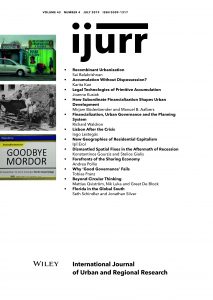Drawing upon the Irish case, this article explores the interaction between the financialized economy and the urban planning system. While considerable scholarship has examined the financialization of real estate, it remains unclear how planning systems are being repurposed to facilitate a finance‐led regime of urban growth or how the ‘real estate–financial complex’ seeks to enact planning policy transformations that support its interests. This article explores how such actors have advanced the concept of ‘financial viability of development’ as a means of influencing the post‐crisis re‐regulation of Irish planning policy. This group has argued that housing construction in post‐crash Ireland is unviable given the high development finance costs, onerous planning gain contributions and the lack of development certainty in the planning process. As such, housing construction has been at an all‐time‐low, leading to a new crisis in affordable housing provision. In response, a complicit state has further liberalized the planning system, introducing an array of policies that are evermore facilitative of development interests. Empirical findings, based on interviews with developers, lobbyists and planners, emphasize the importance of informal access to policymakers, the wielding of ‘expert knowledge’ and media management to co‐opt the state into adopting financial viability within planning policymaking.

